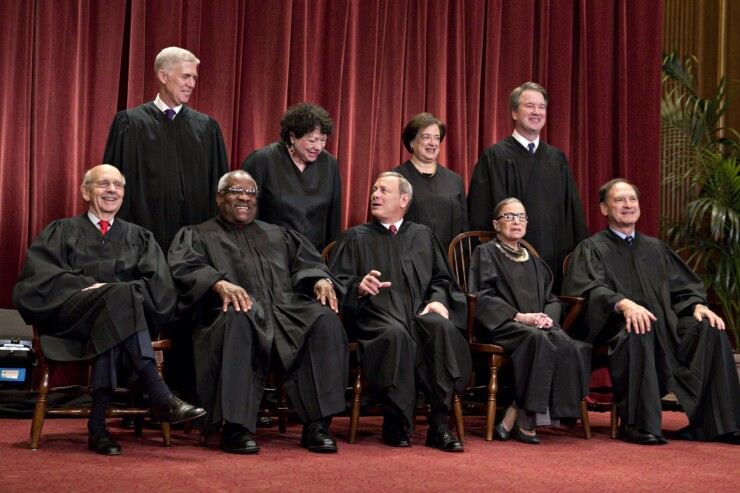
Puerto Rico’s debt restructuring will remain on track as a result of Monday’s unanimous U.S. Supreme Court ruling that upheld the structure of the commonwealth’s financial oversight board.
Board members do not need to be confirmed by the U.S. Senate under the Constitution’s Appointments Clause because the board’s function is primarily local,
The decision was written by Justice Stephen Breyer on behalf of six of his eight colleagues. The two other high court justices, Clarence Thomas and Sonia Sotomayor, filed separate concurring opinions. Sotomayor, whose parents were both born in Puerto Rico, wrote that she did so “reluctantly.”
The challenge to the legitimacy of the Financial Oversight and Management Board for Puerto Rico came from Aurelius Investment, other hedge funds, and an electrical workers union that were seeking better terms under the restructuring.
The Puerto Rico Oversight, Management, and Economic Stability Act enacted by Congress in 2016 gave the board power to file for federal bankruptcy protection on behalf of the commonwealth under the jurisdiction of a federal bankruptcy judge appointed by the chief justice. Members of the seven-member board were appointed by President Barack Obama, with six of them selected from lists submitted by congressional leaders.
The ruling found that although the 2016 law passed by Congress that established the Financial Oversight and Management Board for Puerto Rico gave the oversight board “considerable power—including the authority to substitute its own judgment for the considered judgment of the Governor and other elected officials,” that power “primarily concerns local matters.”
The decision said the 2016 law “substitutes a different process for determining certain local policies (related to local fiscal responsibility) in respect to local matters.”
The Oversight Board said it welcomed the high court’s ruling.
“The members of the Oversight Board have an important mandate: to help Puerto Rico recover from an unsustainable debt burden and decades of fiscal mismanagement,” the board’s statement said. “The Oversight Board has been renegotiating Puerto Rico’s debt and has been steadily working towards instituting long term fiscal planning and balanced budgeting.”
John Mudd, an attorney who represents creditors in the Puerto Rico bankruptcy, said that the commonwealth’s debt restructuring still faces delays this year related to the COVID-19 pandemic.
The bankruptcy reorganization is unlikely to be completed before January or February of 2021, Mudd said.
Evercore's director of municipal bond credit research, Howard Cure, agreed that the bankruptcy reorganization cannot be completed until the territory’s finances are more stable.
The COVID-19 pandemic has disrupted the pathway toward that, Cure said. “It’s an obstacle for every government, particularly for a government that was also hit by an earthquake and a hurricane.”
Cure said it’s problematic for Puerto Rico to try to cut its government payroll when essential services still are needed unless a plan is put in place that triggers the reductions once the emergencies are over.
Cure also said he was glad to see the Supreme Court ruling. “My big question is, will this now somehow embolden the board to act more swiftly or impose more of its will on the territory,” he said. “I’m not sure if they were waiting to give them the authority and what the response will be from the territory as well.”
Might the Oversight Board not try to get as much buy-in from the territorial government before it acts in the future? Cure asked.
Monday’s ruling sent the lawsuit filed by Aurelius back to a lower court, but it was unclear if the hedge funds have any remaining options.
The Supreme Court found that the threshold for the Appointments Clause of the Constitution to be invoked was not met.
“In our view, the Appointments Clause governs the appointments of all officers of the United States, including those located in Puerto Rico,” Breyer wrote. “Yet two provisions of the Constitution empower Congress to create local offices for the District of Columbia and for Puerto Rico and the Territories.”
Breyer wrote that is the “critical point.”
“The local nature of the legislation’s expressed purposes, the representation of local interests in bankruptcy proceedings, the focus of the Board’s powers upon local expenditures, the local logistical support, the reliance on local laws in aid of the Board’s procedural powers—all these features when taken together and judged in the light of Puerto Rico’s history (and that of the Territories and the District of Columbia)—make clear that the Board’s members have primarily local duties, such that their selection is not subject to the constraints of the Appointments Clause,” the ruling said.





